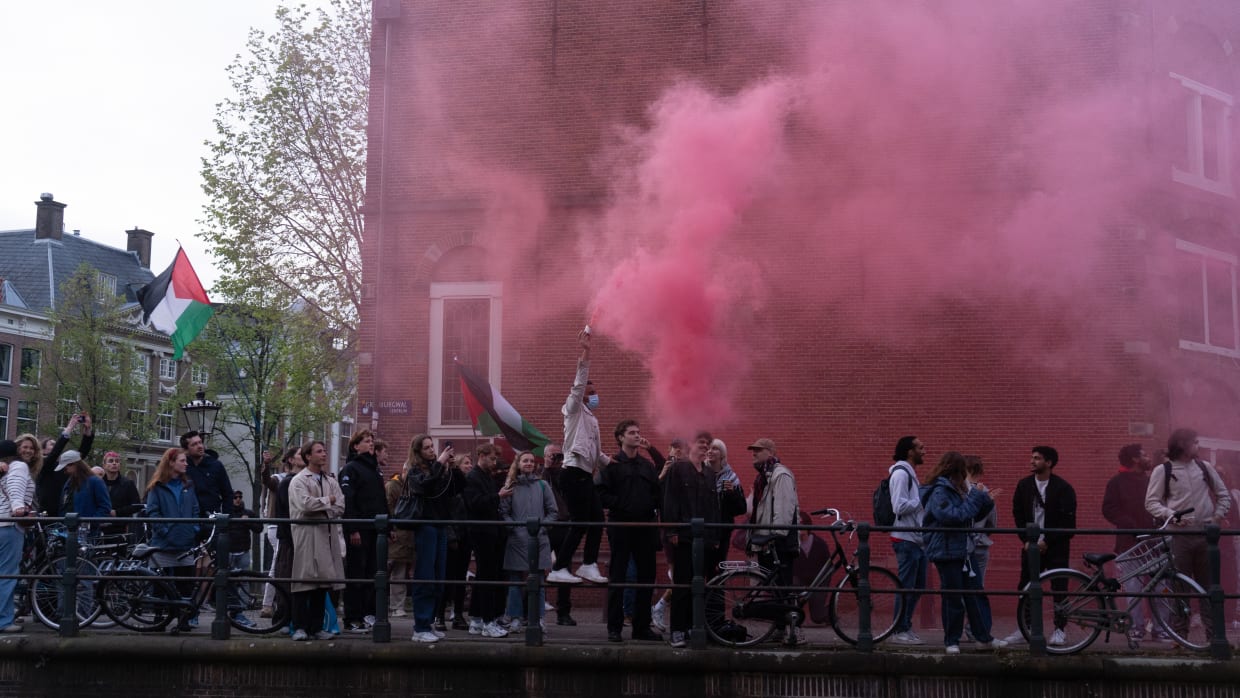
The unreasonableness of student protests
The demands of protesting students are far from reasonable, thinks political science student Sebas Lammers. “Assuming they stand for human rights as universal principles, there are quite a few universities from controversial countries that the UvA also collaborates with.”
This week, it hit several universities in the Netherlands. The expected replication of U.S. campus occupations spread among students at the University of Amsterdam and Utrecht University. The protests at UvA in particular stood out, in part because of the ongoing occupation and police intervention. All these students are demanding the same thing: that their university cut ties with the state of Israel because of the war in Gaza. This demand is unreasonable.
Nonsensical demand
First of all, it is wrong to hold Israeli universities and their students responsible and to blame them for the actions of the government of Netanyahu. While there are some exceptions based on what ties with foreign universities can be severed, such as imposed political sanctions or threats to one’s own security, neither of these apply here. Nor does the UvA contribute to research concerning Israel’s military actions, as the university points out in a response to the occupation.
In contrast, a certain amount of exchange with foreign universities and students can be enriching. Criticism of the number of international students the Netherlands admits is certainly justified, but stopping the exchange of people, knowledge, and ideas altogether? That seems very unwise to me, even if it is with universities from countries with questionable regimes (to the extent that Israel falls under that). After all, this does not exactly promote dialogue.
Besides, these student occupiers are very inconsistent with their vehement protests. Assuming they stand for human rights as universal principles, there are quite a few universities from controversial countries that the UvA also collaborates with. Consider the Universitas21 network. The UvA belongs to this as well as China’s Shanghai Jiao Tong University and Fudan University. In totalitarian China, more than a million Uighurs have been detained in “re-education camps” for years. The South African University of Johannesburg is also a member. According to Human Rights Watch, this country is plagued by high levels of violence disproportionately targeting the elderly, women, LGBTQ individuals, and foreigners. In fact, South Africa is in the top five countries with the highest femicide rate.
In addition, it is also possible at Utrecht University to go on exchanges to countries such as China or South Africa. But students are not against these forms of cooperation. And let me be clear that I am certainly not in favor of ending these ties; on the contrary, we should preserve them. Yet some hypocrisy is thus not foreign to these students.
Spiritual emptiness and oversimplification
The question then arises as to why these students are protesting with such unreasonable demands. Psychiatrist Esther Fennema previously addressed this question in EW Magazine. Fennema argues that “many young people struggle with spiritual emptiness. They do not feel rooted in a society whose highest goal is to consume and be as profitable as possible.” As political philosopher Patrick Deneen rightly argues, today’s (neo)liberal society is geared toward atomized individuals, or res idiotica in Ancient Greek. Both Deneen and Fennema conclude that this leads to insecurity, loneliness, and fear. Man, on the other hand, is a political and social being, making this form of society inadequate. To fill this spiritual void, Fennema analyzes that these students are concerned with something greater. Something that transcends them and offers them hope. Demonstrating for these kinds of great “injustices” includes that. Hence this occupation, based on nonsensical demands.
This also results in an oversimplification of the issue, as evidenced by the students’ lack of interest in a dialogue.
Earlier we saw students disrupting a Room for Discussion meeting with Dutch Lieutenant Admiral Rob Bauer to argue against NATO and for a free Palestine. This week we are seeing images of journalists being chased off public property. These media lash out at them, firing off their simplistic slogans. Also, barricades, vandalism, and face masks do not exactly invite conversation. It may impress your peers but alienates many others in the process. It is a shame that such protests take the nuance out of the Israeli-Palestinian debate, a conflict that requires a proper and reasonable dialogue.
Public discussion of the Israeli-Palestinian conflict regularly reveals its emotionally charged nature. This is understandable but is no justification for wreaking havoc and destruction at universities with unreasonable demands that are in no way going to make a difference. This situation does not suit a university, as it should be a (physically) safe place for everyone, where debate and discussion are central. This is the only way to create mutual understanding and to learn from each other.
Sebas Lammers (21) is studying political science at the University of Amsterdam and has also completed a bachelor’s degree in history.

